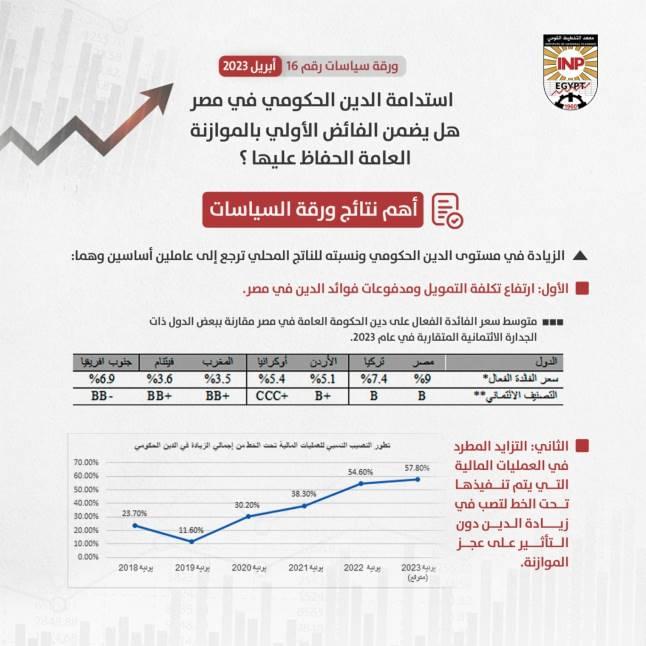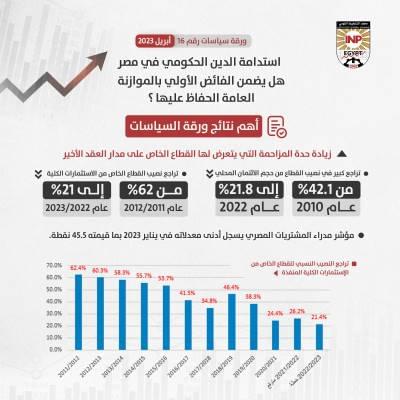Under the title “Sustainability of Government Debt in Egypt: Does the Primary Surplus in the General Budget Ensure Its Preservation?” The Institute of National Planning announced the results of its latest edition of the series of policy papers. The so-called debt of the public budget agencies, which is the largest component of the balance of the Egyptian public debt, as the balance of this debt amounted to about 6.9 trillion pounds, or 87.2% of the GDP in June 2022.
The study indicated that the Ministry of Finance is adopting a strategy to reduce the level of this debt to about 79% of GDP by 2027, by aiming to achieve an annual primary surplus in the general budget at a rate of 2% of GDP.
By analyzing the current policy paper of the developments witnessed by the Egyptian government debt over the past six years and the main sources of debt accumulation during that period, the paper reached several results, including that the primary surplus achieved by the general budget over the past six years is not sufficient to maintain The sustainability of government debt, as achieving this surplus was accompanied by a steady increase in the value of this debt and its ratio to GDP as a result of the high cost of borrowing and debt interest payments, in addition to the significant increase in below-the-line financial operations, which lead to an increase in the accumulation of government debt without affecting the annual budget deficit. .
The study also indicated that the increase in the size of government debt and its ratio to GDP was associated with an important shift in the structure of this debt, as the relative share of external government debt increased from 17.7% of the government debt balance in June 2018 to 19.2% in June 2022. It reaches 22.4% of the government debt balance in June 2023, which increases the amount of financial risks and raises the size of the sustainability threats facing this debt, especially in light of the instability of the national currency exchange rate.
The study pointed out that the large expansion in government borrowing has resulted in this borrowing exceeding the volume of public revenues, for the first time in the history of the Egyptian budget, which could have many economic and social repercussions and effects, foremost of which is the continued escalation of the frequent waves of inflation that the government is exposed to. It has had the Egyptian economy since the beginning of 2022, and the consequent great economic and social effects, especially on the low-income classes, which places more burdens on the public budget to increase support and protection programs for those classes.
The expansion of government borrowing also resulted in a significant decline in the share of the private sector in the volume of domestic credit from 42.1% in 2010 to only 21.8% in September of 2022, which resulted in an unprecedented decline in the volume of activities and investments carried out by this sector. Where the data of the Ministry of Planning indicates a decline in the relative share of the private sector in the total investments implemented, to reach only 26.2% in the fiscal year 2021/2022, compared to 62.4% of the total investments in the fiscal year 2011/2012.
The paper put forward a set of procedures and recommendations necessary to maintain the sustainability of government debt and reduce it to the desired level. These measures include strengthening the path of sustainable economic growth, as it is the main pillar for preserving the sustainability of public debt, both governmental and non-governmental, and activating the approach announced by the Egyptian government. Concerning state ownership policy and strengthening the role of the private sector in economic activities, as well as adopting a flexible and competitive monetary policy based on foundations that enhance the ability of the private sector to invest and export, even if those foundations conflict with the short-term goals of attracting foreign investments in government debt instruments.
In addition to the foregoing, the recommendations include adopting a unified legislative framework for managing public debt in Egypt, while continuing to develop a medium-term strategy for managing public debt, in addition to establishing rules for transparency and disclosure in distinguishing between governmental public debt and non-governmental public debt, and disclosing the debts of all public companies. And work to achieve efficient and effective coordination between the fiscal and monetary policies with regard to managing public debt, in a way that guarantees the sustainability of this debt and reduces it to the desired level.
The recommendations also include adopting a package of institutional measures necessary to achieve financial discipline and raise the efficiency of public spending by committing to applying the principle of budget unity and not expanding spending outside the budget through set aside revenues and taxes, as well as setting a timetable to resolve all financial entanglements between the public treasury, economic bodies and companies. the public.
The study added, the need to complete reform and development efforts to raise the efficiency of the Egyptian tax system by activating Article (139) of the Income Tax Law No. 91 of 2005 regarding the establishment of the Supreme Council of Taxes while continuing to generalize the application of the electronic bill system to include all companies and activities, as well as disclosure The real size of the Egyptian tax community, especially in commercial and industrial activities and free and non-commercial professions.







